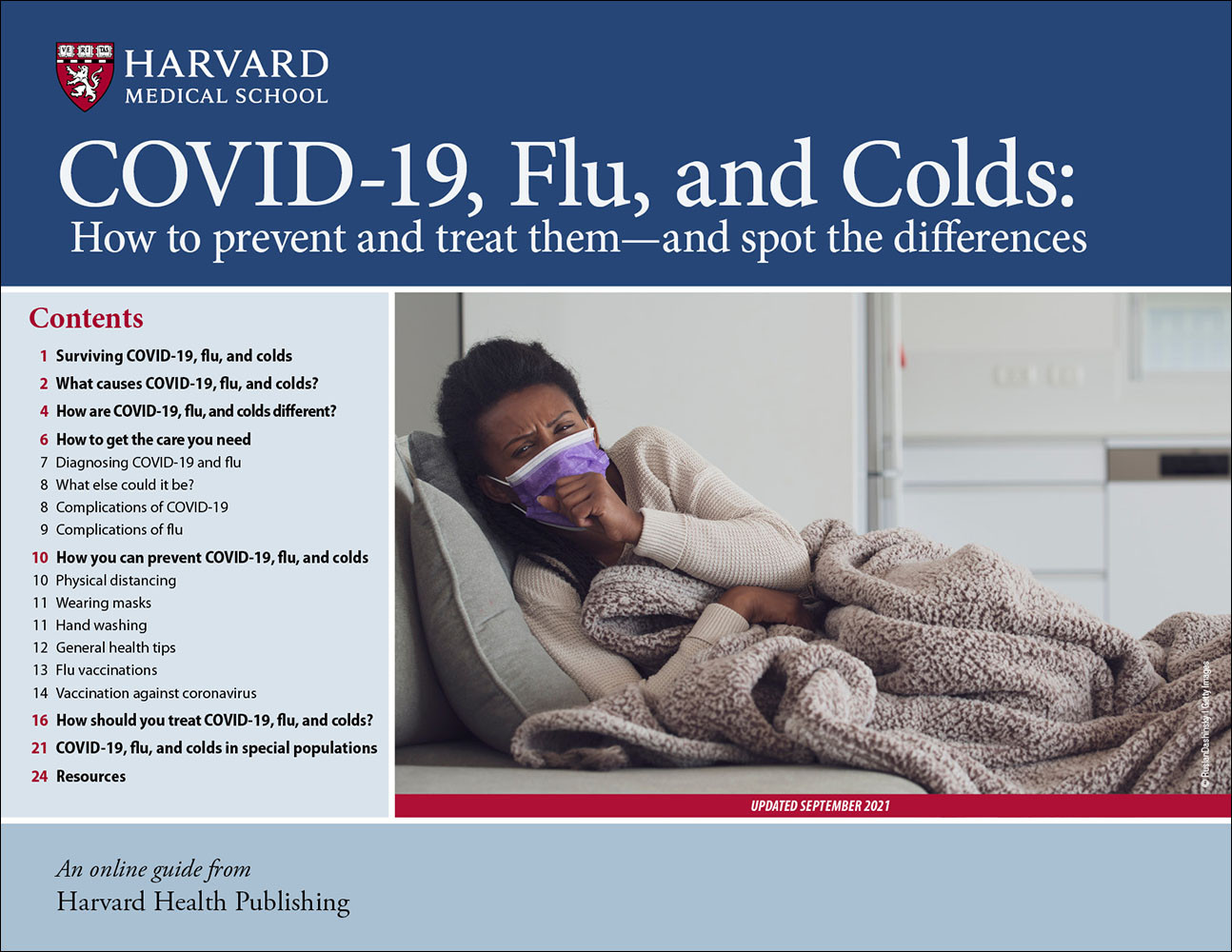Lessons learned from COVID
Living through the pandemic has changed many people's health habits, sometimes for the better.
- Reviewed by Howard E. LeWine, MD, Chief Medical Editor, Harvard Health Publishing; Editorial Advisory Board Member, Harvard Health Publishing

More than three years after COVID emerged, people are anxious to resume their pre-pandemic lifestyle. But don't be too quick to return to old habits. "Even though COVID brought stress and anxiety, it also changed how we live and approach our health, and in many ways, for the better," says Dr. Edward Phillips, founder and director of the Institute of Lifestyle Medicine at Harvard-affiliated Spaulding Rehabilitation Hospital. "The experience of living through COVID can be a teachable moment about how to continue the healthy habits we adopted during the pandemic."
Here's a look at four areas of health maintenance affected by COVID and the positive changes they created.
Exercise
With gyms and fitness centers closed, people had to find ways to stay active. Home workouts, online classes, and outdoor solo outings became the norm.
Keep it going. "The plus side of being forced out of your exercise routine is that it may have shown you new activities that you enjoy," says Dr. Phillips. For instance, some people have discovered that they prefer working out at home on their own schedule. Others have tried a new endeavor, like Peloton membership, and found it offers excitement and motivation they previously lacked. Even if you decide to return to your pre-COVID exercise style, consider expanding your repertoire.
"Be mindful that you are a different person now and may have new fitness goals and interests," says Dr. Phillips. For example, if you like gyms, try a new one that offers different classes, perhaps yoga or Pilates. Or explore boot camps that center around structured group workouts, or invest in short-term personal training sessions. If you've been power walking or cycling alone, consider joining a group or signing up for an event.
Diet
At the start of the pandemic, takeout delivery was popular. But over time, and to cut down on expenses, more people turned to home-cooked meals. "And anything you make at home is almost always healthier," says Dr. Phillips.
Keep it going. Online grocery shopping was helpful during COVID, as it was safe and convenient. It also encouraged healthier shopping habits, according to Dr. Phillips. "You are less likely to make unhealthy impulse purchases when ordering online compared with shopping in person," he says. Try to continue online shopping, or at least mix it in with your regular grocery shopping. "Buying groceries online also can inspire you to try new healthy meals, expand your palate, and build your cooking skills," says Dr. Phillips.
Medical check-ups
A CDC study found about 40% of adults avoided routine medical care and check-ups during COVID. Make a list of your recent physicals, blood work, dental cleanings, eye and ear exams, and dermatology visits. Then go through the list and make appointments, starting with the most overdue.
Keep it going. A bright spot from COVID was the emergence of telemedicine, or virtual health care, in which you can consult with a doctor or nurse via video using your computer, tablet, or smartphone. Many people enjoyed the simplicity and time savings of telemedicine compared with office visits, and studies showed a surge in virtual appointments during the pandemic.
Telemedicine works well for follow-ups and consultations for minor issues, and routine check-ins for conditions requiring constant monitoring, like high blood pressure and cholesterol. "But you'll still have to do in-person visits for some routine check-ups and specialized care," says Dr. Phillips.
Social connections
Regular social interactions dropped off during the pandemic. The upside? COVID may have revealed your most valuable relationships, by showing which people you really missed — and which ones you didn't, says Dr. Phillips. "You may have found you value some friendships more than you thought, and now you can invest more in them."
Group interactions also may have changed. For instance, you may find you don't miss larger gatherings but now cherish smaller, more intimate settings. "In this case, devote time to those gatherings that you find comfortable and enjoyable," says Dr. Phillips.
Keep it going. Zoom, Google Hangouts, Microsoft Teams, and other videoconferencing platforms are here to stay. "They helped people stay connected during the lockdowns, and now they can serve to continue social relationships regularly," says Dr. Phillips. "You don't need to wait until the next face-to-face opportunity."
A trend during COVID was "virtual happy hour," where co-workers got together after working hours to mingle on video calls. "Continue this by scheduling a weekly virtual visit with friends or family members to strengthen your social life," says Dr. Phillips.
Image: © Milos Zivojinovic/Getty Images
About the Author

Matthew Solan, Executive Editor, Harvard Men's Health Watch
About the Reviewer

Howard E. LeWine, MD, Chief Medical Editor, Harvard Health Publishing; Editorial Advisory Board Member, Harvard Health Publishing
Disclaimer:
As a service to our readers, Harvard Health Publishing provides access to our library of archived content. Please note the date of last review or update on all articles.
No content on this site, regardless of date, should ever be used as a substitute for direct medical advice from your doctor or other qualified clinician.
















